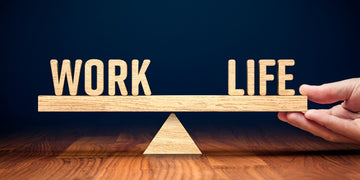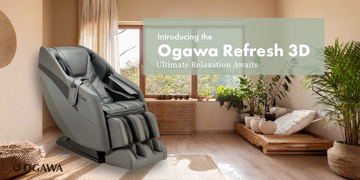Maintaining a healthy work-life balance is a critical part of self-care when balancing the responsibilities of your professional and personal lives. Whether you’re working from home permanently or making a transition back to going into the office, your work-life balance affects health and wellness more than you may realize.
To help you identify areas where your regular routine may need some adjustments, we’re exploring how work-life balance affects health and ways to improve it. You’ll learn how work-life balance and health go hand-in-hand and make a major impact on your overall well-being.
How Are Work-Life Balance and Health Related?
You may not realize it, but work-life balance and health are very closely related. In fact, not maintaining a healthy work-life balance affects health in the present and may lead to serious complications in the future.
What is work-life balance? It’s a term you’re probably familiar with, though you may find it that balance eludes you at the moment. Simply put, work-life balance is the trade-off between your professional and personal time. It can be measured by how much time you’re devoting to work versus personal time spent on anything else. It can also refer to how much flexibility your schedule has in terms of handling demands on either side as they arise.
Some studies have shown that individuals who work 55 hours or more per week have a 1.3 times higher risk of stroke than those working standard hours. Other studies have shown that sleep deprivation, a negative health imbalance that affects a reported 1 in 3 adults in the United States, could lead to higher risks for heart disease or stroke, as well.
Not just a negative for physical health, work-life balance and health are connected for your mental well-being, too. Studies have recommended that work-life balance be recognized as a notable public and mental health issue.
Areas Where Work-Life Balance Affects Health
Without a healthy equilibrium, work-life balance affects your health negatively. How can you tell if your work-life balance is out of sync, however? What are some instances that could occur and how can you improve it?
Some of the ways work-life imbalance could lead to a negative impact your health that you may not have considered are:
- Sitting more often
- Having less time for self-care or engaging activities
- Not eating or adopting an unhealthy diet
- Excess stress and anxiety
- Poor sleep quality
Sitting Too Long
The first way work-life balance affects health negatively could stem from sitting too long. You may not know it, but sitting too long can have a profoundly negative impact on your health. It can lead to higher blood pressure, poor circulation, a lowered immune system, back pain, and bad sitting habits.
When your work-life balance is out of sync, you may find yourself working in the office too long or staying in your home office setup later into the evening. To help combat the negative impacts of sitting too long and get your work-life balance and health back into a better equilibrium, take regular breaks throughout your day to stand and move around. There are loads of easy exercises you can do in your office, in an empty break room, or even out by the car to stretch your body and keep muscles from seizing. Keeping your body loose is important.
Furthermore, to avoid sitting too long because you’re working too many hours for a healthy work-life balance, try to schedule your day so that you’re mindful of your own time. Setting boundaries for yourself about how long you’ll work and when you’ll stop for the day is a huge way work-life balance affects health and should be a priority.
Less Time for Self-Care or Personal Activities
Another way poor work-life balance affects health negatively is that you may find yourself giving up personal activities or removing self-care from your regular routine. When we are overworked, we start to look for ways to cut out anything we don’t have energy for or don’t feel we have time for. Unfortunately, the activities we drop tend to be the ones most crucial to our own happiness and long-term well-being!
To rebalance the scales, commit to taking care of your own needs and try to be cognizant of your mental and physical health. If you begin feeling overwhelmed, it may be time to step back from work and focus on self-care to maintain a healthy balance.
There are also activities or routines you can integrate into your regular schedule to help maintain an equilibrium between work-life balance and health such as getting a regular massage. Regular massages help keep the body loose, improve mental health, manage stress levels, and provide pain relief. Instead of trying to fit regular appointments into an already-overstuffed schedule, many people are turning to the benefits of owning a massage chair, instead.
Today’s luxury massage chairs have evolved to provide a variety of different types of massage programs and features that are aimed to help you relax and recharge. Some of the greatest benefits of massage therapy at home is that you can experience it when you need it, as you need it, and from the privacy of home.
For the most advanced full body massage chair experience to help combat the negative impact of poor work-life balance, you might consider getting an AI massage chair. These chairs are so advanced, they’re able to use two types of body scanning technology to determine a unique massage experience tailored to your body’s needs each time!
Integrating regular customized massage experiences into your regular routine eliminates any difference between using a massage chair vs human massage and makes it more likely that you’ll focus on self-care routinely.
Not Eating or Adopting an Unhealthy Diet
Unfortunately, another negative way poor work-life balance affects health is through what we eat. When we feel overworked or exhausted from excessively long hours, coming home and having to make ourselves dinner can feel overwhelming and we may turn, instead, to unhealthier options. Some people may even find themselves skipping meals altogether from feeling stressed out and overworked, also resulting in a negative correlation between poor work-life balance and health.
To combat this, be sure to take your lunch break and step away from your desk whenever possible instead of working through lunch. This break is meant to give yourself time to rest and recharge before taking on the rest of the day, making it vital to your overall work-life balance.
In terms of eating at home in the evenings after work, leaving at a set time each day can help develop a healthy habit and appropriate work-life balance. When you know what time you’ll finish working each day, it’s easier to mentally prepare for the rest of your evening and make healthier decisions. For those occasionally unavoidable long days, however, it can help to keep a few simple meals on hand at all times. This makes it less likely you’ll opt for unhealthy snacks or fast food, which can be a slippery slope for many.
Poor Sleep Quality
Last, though certainly not least, in our exploration of how poor work-life balance affects health and how to improve it concerns sleep habits. Excess stress and exhaustion from poor work-life balance can negatively impact sleep quality. Experts agree adults should strive for 7 to 9 hours of sleep each night. Unfortunately, almost one-third of adults in the United States report getting less than that, which can lead to prolonged sleep deprivation. Sleep deprivation can lead to elevated risks of heart disease, diabetes, high blood pressure, and other negative health ailments.
To help improve sleep quality and restore work-life balance, try to set a schedule for when you go to bed and when you wake up each day. Creating a routine helps our minds prepare for sleep more efficiently, allowing us to get more restful sleep that can translate into better work performance. Continuing the cycle, better concentration and performance at work can help us maintain a better work-life balance overall.
As you can see, work-life balance affects health and vice versa. Together, they create a cycle that is delicate and important. Finding ways to adjust your habits to create a better work-life balance can be integral to your health now and in the future. Whether you’re setting a strict work schedule for yourself, no longer skipping lunch breaks, or choosing a massage chair to integrate into your regular routine, find what works best for you and you’ll notice the difference right away.
To learn more about the benefits of owning a massage chair and how it could enhance your lifestyle, check out these additional resources:





